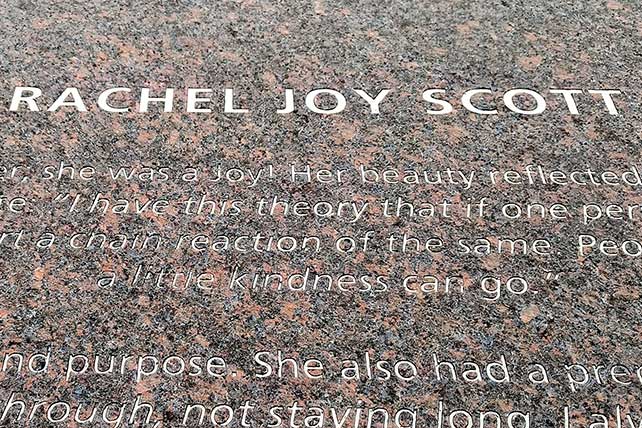A quarter-century ago, 16-year-old Craig Scott was studying in the Columbine High School library in Littleton, Colorado, when two fellow students opened fire. After the shooting ended, the teen boys who’d been sitting on either side of Scott were dead. So was his 17-year-old sister, Rachel Joy Scott, who’d been eating lunch outside.
Now 41, Scott spoke to ChurchLeaders on Friday (April 19) about his ongoing efforts to honor his sister. During an interview in the park next to Columbine, Scott discussed his mission to spread messages of positivity, forgiveness, and self-worth.
Craig Scott on the Power of Sharing Stories
In what was then the deadliest school shooting in U.S. history, 12 students and one teacher died on April 20, 1999, at Columbine. The name became synonymous with school violence and a source of copycat plots. But it also inspired efforts to share kindness, increase school safety, and address bullying, mental health, and gun control.
Scott’s family launched the organization Rachel’s Challenge, and Craig Scott later cofounded Value Up. For years, he was a full-time speaker, sharing with more than 1 million students his sister’s story and his own road to healing.
While speaking to kids of all ages, Scott discovered the power of stories. “You can’t become preachy or try to force a message,” he said. “People are 10 times more likely to remember a story, because we think in narrative.”
Now a producer and director in Atlanta, Scott focuses on telling inspirational true stories. “There are so many voices in media today,” he told Church Leaders. “I want to tell stories that help people, and kids today want stuff that’s true.”
One upcoming project, a movie titled “Possum Trot,” tells about an East Texas congregation that adopted dozens of children from the foster-care system. The movie, from Angel Studios, releases on July 4.
Scott is also launching a new podcast called Pain Into Purpose, featuring people who’ve endured and overcome tragedies.
Sister’s Death Sparked a ‘Strong Sense of Mission’
Scott, whose father and grandfathers were pastors, grew up in a Christian home. Amid the initial shock of Columbine, he told friends it felt like people were praying for him. But Scott also dealt with anger, violent dreams, and feelings of brokenness.
When asked what it’s like to return to Columbine, Scott said he decided not to carry around sadness but to focus on healing. “I want to honor my sister, my friends, my community,” he told ChurchLeaders, adding, “This is where my calling was birthed.” Scott also said he’s grateful for the ongoing bond with classmates, who share a camaraderie from experiencing something so difficult together.
After his sister’s murder, Scott said he felt a “strong sense of mission” fairly early on. He admitted to doing some “bargaining with God” during the terrifying ordeal in the Columbine library. “If I survive, I’m gonna make a positive difference with my life,” he prayed.
“I already believed that God is sovereign,” Scott said. “I already had a belief that ultimately God has an amazing plan for his creation and that his ultimate goal—through the bad or good in our life—is to bring us closer to him.” He also knew every person has inherent, God-given worth.
When he shares that message in public schools, Scott is allowed to talk about faith in the context of Rachel’s story. Although he can’t proselytize, he said educators want him to share what helped him heal, even if that involves concepts such as forgiveness and peace.

